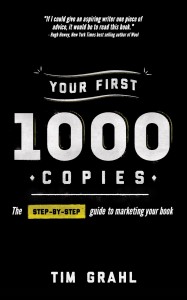Tag Archives for " Two Navy Guys and a Novel "
Why Marketing Your Book is Like Looking for a Job
 A few years ago, when I was General Manager of a small engineering division, we needed to hire another mechanical engineer for a new project. “How hard could it be to find a qualified mechanical engineer in Boston?” I thought to myself. It was 2010, and the local job market was terrible. Heck, I considered myself lucky to be able to add another headcount.
A few years ago, when I was General Manager of a small engineering division, we needed to hire another mechanical engineer for a new project. “How hard could it be to find a qualified mechanical engineer in Boston?” I thought to myself. It was 2010, and the local job market was terrible. Heck, I considered myself lucky to be able to add another headcount.
A week later I asked for an update from my HR person. “I have 54 resumes in my inbox,” she said confidently. “I’ll screen them and get a shortlist to you this afternoon.”
She knocked on my door later that day. “Sorry, nobody met the qualifications.”
“How is that possible?” I’d been burned before by job descriptions that described perfect candidates with flawless credentials and fifteen years experience, but I had personally reviewed the specs for this position and they were reasonable.
She shrugged. “The internet.”
A couple years later I was the one looking for a new job. I signed up for a few search services and the job descriptions started to flow in, all with bright green APPLY HERE buttons flashing at the bottom of the page. I found at least a dozen jobs I was qualified for that looked interesting. (And a few that I wasn’t qualified for, but what the heck, maybe I should just put my resume in anyway.)
Long story short: I “applied” for six jobs in about fifteen minutes. You know how many companies got back to me? Zero.
What Does This Have To Do With My Book?
As a full-time writer, I am constantly amazed at the feeling of deja vu I get in my new career. Take the story above. What does looking for a job have in common with marketing your book?
Everything. When you’re looking for a job, you are selling yourself. When you market your book, you’re selling the same thing–yourself.
But, wait, that’s not right. I just want people to buy my book, not me. Well, not exactly. What you really want is someone who is going to buy this book and all the books you’ve already written and all the books you will write on the day they come out.
In other words, you want people to buy you.
With that in mind, what useful comparisons can we draw between a job hunt and marketing the writerly you?
Patience
For me, the toughest part of looking for a new job was working on someone else’s timetable. In business, when I placed a call to someone, I’d expect a call back in a day or so, usually sooner than later. That rule goes out the window when you become unemployed. To be clear, you do get a call back, but it might take a week or two. After all, you’ve got lots of time, right?
Marketing your book is the same thing. People read according to their own schedule, be they bloggers, friends, or fans. It’s a marathon, not a sprint.
Build New Habits
As a job hunter, you need to establish a means of staying sane. Break down the goals of your search into manageable bits, build a daily routine around them, and keep track of your progress. Do it everyday. Good days, bad days–everyday. For example, maybe your goal is to build up your network, so you set a daily routine of getting back in touch with two old business contacts and connect with two new ones. Four phone calls/email a day, that sounds pretty simple. Here’s the most important part: Write it down. Who you talked to, notes on the topic, when you should follow up, it all goes into a spreadsheet.
Why keep a record? Apart from the obvious benefit of keeping track of your efforts, it gives you something tangible to fall back on when forward progress slows. Use hard data to reassure yourself that you are doing the right things to be successful long term and avoid the downward spiral of doubt.
For most of us, marketing your book is the same way. A few indies hit it out of the park on their first at-bat, but most of us labor in obscurity for a number of novels before we’re noticed. Pretty lonely existence, am I right?
 Tim Grahl of Your First 1000 Copies: The Step-by-Step Guide to Marketing Your Book, and self-described “Lead Guy” of Out:think has this advice: every week plan two things to promote your book. Maybe it’s contacting a reviewer or arranging a Kindle Countdown. Whatever. If the only way to eat an elephant is one bite at a time, chow down at a rate of two bites per week, every week.
Tim Grahl of Your First 1000 Copies: The Step-by-Step Guide to Marketing Your Book, and self-described “Lead Guy” of Out:think has this advice: every week plan two things to promote your book. Maybe it’s contacting a reviewer or arranging a Kindle Countdown. Whatever. If the only way to eat an elephant is one bite at a time, chow down at a rate of two bites per week, every week.
Oh, and get started writing your next book with all that free time.
The Karma of Networking
Networking, especially in the context of a job search, has a bad reputation. Cue the cartoon of smarmy, business card thrusting me-firsters at forced “networking events.” It’s a scene most of us are not comfortable with at all.
The best advice I ever got about networking was this: Ask what you can do to help the other guy. Most of the time, they’ll smile and politely decline, but you’ve established yourself in a small way as a giver and that means something to most people.
But I’m here to suggest you take it one step further. Look for a chance to help someone out without them even asking. In Grahl’s book he calls it being “relentlessly helpful.” You will feel all gushy inside and that person you’ve helped will never forget your random act of kindness.
Let’s be clear, this is not quid pro quo. Lose the “if you do this, I’ll do that” mindset. Make it about the other guy and trust in the goodness of your network to do the same for you. Have I met people who gladly took a favor and were nowhere to be found when the opportunity came to help me? Sure, and it’s disappointing, but I’ve also met people who barely knew me yet went out of their way to offer a helping hand when I needed it most.
 Again, strong parallels with your book marketing efforts. Do a book review for another indie, offer to host a launch announcement on your blog, join a critique group, or go to readings of local authors. These are all ways to meet people in the writing community.
Again, strong parallels with your book marketing efforts. Do a book review for another indie, offer to host a launch announcement on your blog, join a critique group, or go to readings of local authors. These are all ways to meet people in the writing community.
As a former business guy, I’m connected to a lot of people on LinkedIn, a platform that sends out notices on work anniversaries, new jobs and the like. I make it a point to say hello to old friends and let them know I made a career change. Some stop by my website, and a few sign up for my mailing list. There is no BUY MY BOOK in this interaction, just an old acquaintance stopping by to say hello.
Confidence is King
Even if you follow the steps above, it’s tough to keep your self-confidence in the face of minimal progress. Maybe you think you need to turn up the volume, be more aggressive in marketing yourself.
Introspection is a good thing. Trying to be something you aren’t is not.
Pretty soon, almost without you realizing it, your networking takes on a note of desperation. Instinctively people start to back away. Why? Confidence. When you’re right with yourself and your environment, people want to be associated with you. To instill confidence, you need to be confident about yourself.
In book marketing, just like in job hunting, you need to have faith in your product–you. If you’ve done the best work you know how to do, then smile, turn off the evil voices in your head (okay, maybe that’s just me), and get to writing your next book. Your day will come.
Of course, I know someone will point out in the comments that there’s one big difference between book marketing and looking for a job–when you get the job, you’re done.
Not so fast. Anyone who’s ever put the time into a professional job search will tell you that once you learn the lessons above–patience, routine, networking and confidence– you never unlearn them. They’ve become part of you.
Whether you’re looking for a job or your next reader, here’s to your success.
David Bruns is the creator of the sci-fi series The Dream Guild Chronicles, and one half of the Two Navy Guys and a Novel blog series about co-writing the military thriller, Weapons of Mass Deception. Check out his website for a free sample of his work.


